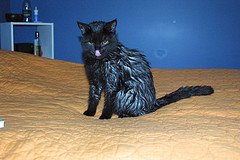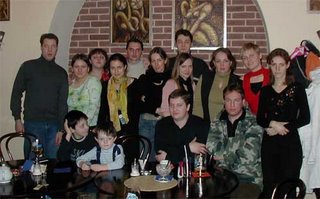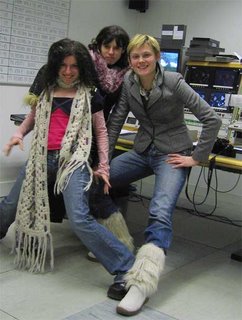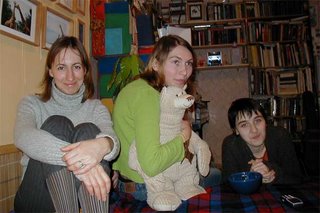Monday, March 27, 2006
"The idea that journalism situations are so unique as to defy principles and guidelines is an exaggeration. In journalsm, we face similar types of stories day in and day out." Stephen J.A. Ward
Canadian experience from a French perspective
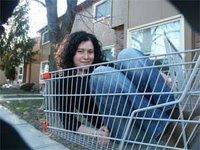 - By Katia Moskvitch -
- By Katia Moskvitch -Working as a waitress in one of numerous Lyon’s cafés, Sabah Guidoum, 21, often heard people talking about Canada. And the more the French girl of Algerian descent listened to random conversations or to people speaking directly to her and describing what a wonderful country Canada was, the more she wanted to go there.
“It’s funny,” she says with a French accent, laughing. “For some reason, every time I went to work, someone would mention Canada to me. And it was an ordinary café, not some special one for Canadians or anything like that.”
Hearing so much about Canada in a place where she least expected it raised Guidoum’s interest to the point that finally all she wished for was to visit this country.
Guidoum decided to do a university exchange at the University of Western Ontario. She chose to study in the media, information and technoculture program, which corresponds the most to the one she followed in France. In Lyon, she is in her first year of a master’s in communication and information. Hopefully, she says, all the classes that she’s taking now at Western will count towards her French degree.
“I’ll still have to study for one year when I come back home, because it’s a two-year masters,” she says. “And I have no idea what I will do after that. I wanted to be a journalist at one point, but now I think I’d rather work as a film critic.”
Guidoum sits in her room in a house she shares with four other students. The walls are covered in posters featuring Star Wars, one of Guidoum’s favorite movies. She says she enjoys cinema, and even follows some courses in film studies at Western. Recently, she produced a series of short movies for one of her classes. One of them was about something that made a very strong impression on the French student: a skunk.
“For me, a city is not a place for skunks. Their place is the forest. But in London, they are everywhere!” laughs Guidoum, describing how once she stayed over at a friend’s place and they saw a skunk searching for food at a garbage collection site nearby. “We were careful to take our garbage out without approaching the skunk because when it stinks… well, it stinks!”
It’s been two months since Guidoum came to London, and so far she’s enjoying her stay. She parties a lot, but studies a lot too. In France, students usually don’t study continuously; the only intense study period is before exams.
“Here, I have to read a hundred pages a week!” complains Guidoum. “But I was able to choose all my classes, something we can’t do in France.”
Guidoum does not know whether she will go back home once the school year is over. But she is certain that while she is in Canada, she’ll have a good time.
“I’m here to have fun,” she says, “and I will make sure every single day of my stay here is a fun one!”
UWO international students might be able to work off-campus
- By Katia Moskvitch - (Written in June 2005)
Kate Stepanova, an international fourth-year Honours student in Political Science at the University of Western Ontario, points at a waitress at a Thai restaurant in London.
“I’m almost sure she is a student working here illegally,” she says. “Many international students at UWO are unable to find work on campus. They are forced to find illegal jobs off-campus and get paid under-the-table.”
Stepanova came to London from a northern Russian city Yakutsk. Her parents pay her tuition, which amounts to around $14,000 per year. They also pay for her apartment in London.
She would like to be able to pay at least some of her living expenses to help them, Stepanova said, but is unable to do so. She tried finding a job on campus, but was never hired.
In Ontario, international students are not allowed to work off-campus, and there are not many positions on campus where they can apply.
The situation, however, is about to change.
A reform called Citizenship and Immigration Canada Off-Campus Work Initiative (OCWI) was announced this spring by the Canadian government. When implemented, it will allow international students to work off-campus during their full-time university studies, said Scott Courtis, Executive Director of the Ontario Undergraduate Student Alliance.
“We’re hoping it’s going to be as soon as September,” said Courtis. “It is one of our priorities to implement the initiative as promptly as possible.”
Rose Aquino, International Student Advisor at UWO, said that Quebec, Manitoba and New Brunswick already signed the necessary bilateral agreements for the new regulation to be put in place.
“Right now, we’re waiting for the Ontario government and for the federal government to sign an agreement and work out what the regulations will be, and once that’s set, students will know whether they qualify, will apply for a work permit and will be able to work off-campus,” said Aquino.
Off-campus work is not the only issue the UWO officials are concerned with when it comes to helping students from abroad finance their studies. This past winter, the university had enough funding to launch the International Student Work Opportunities Program (I.S.W.O.P.), which permitted 15 students to find jobs on campus, said Aquino.
“We have had an idea about this program for a few years, but the funding wasn’t there. Finally, miraculously, the funding came through, and we’re very excited,” added Aquino, and pointed out that the International Students’ Services had some positive feedback from those students who were hired through I.S.W.O.P.
Glen Tigert, Director of Student Financial Services and Student Records at UWO, said that the university is currently trying to get more funding for international students. The federal government does not provide Canadian universities with money destined for students from abroad. At UWO, the main sources of funding are the university’s institutional funds and private donations.
More funding means more international students will be hired through I.S.W.O.P., said Tigert. In order to pay salary the students who work on campus, UWO has to have money, and that money depends on the amount of funding.
“It is an area of focus at Western, and I am confident that we will have more money available for international students in coming years,” said Tigert.
Fifteen students, hired by I.S.W.O.P. in the winter semester, out of approximately 2,400 international students that come to UWO every year does not sound like a lot, said Teddy Ouyang, a Canadian permanent resident originally from China.
“But it is better than nothing,” she added.
Ouyang is currently enrolled in the Bachelor of Health Science program and works at Weldon Library during the summer.
“I sent an email to the supervisor who asked me to come in for a very brief interview, and I got the job. But for international students it is a lot harder to get a job on campus or anywhere”, said Ouyang.
“I am happy it (the situation) is going to change,” added Ouyang, and mentioned that she was especially happy international students would soon be allowed to work off-campus.
“My friends are Chinese students, and they work illegally in Chinese restaurants. That’s the only way they can get jobs, and they get paid something like five dollars an hour,” said Ouyang.
“They are afraid let other people know where they work, because they can get sent back to China, and I’m sure they will be happy to know that they will be allowed to get legal jobs off-campus,” she added.
Daphne Zhang, an international student from China in her third year of Administration and Commercial Studies at UWO, never worked in Canada. She said she was excited to find out about a possibility of getting an off-campus job in the near future.
“I want to find any job,” said Zhang. “I want to get work experience, it is very important,” she added.
Kate Stepanova, an international fourth-year Honours student in Political Science at the University of Western Ontario, points at a waitress at a Thai restaurant in London.
“I’m almost sure she is a student working here illegally,” she says. “Many international students at UWO are unable to find work on campus. They are forced to find illegal jobs off-campus and get paid under-the-table.”
Stepanova came to London from a northern Russian city Yakutsk. Her parents pay her tuition, which amounts to around $14,000 per year. They also pay for her apartment in London.
She would like to be able to pay at least some of her living expenses to help them, Stepanova said, but is unable to do so. She tried finding a job on campus, but was never hired.
In Ontario, international students are not allowed to work off-campus, and there are not many positions on campus where they can apply.
The situation, however, is about to change.
A reform called Citizenship and Immigration Canada Off-Campus Work Initiative (OCWI) was announced this spring by the Canadian government. When implemented, it will allow international students to work off-campus during their full-time university studies, said Scott Courtis, Executive Director of the Ontario Undergraduate Student Alliance.
“We’re hoping it’s going to be as soon as September,” said Courtis. “It is one of our priorities to implement the initiative as promptly as possible.”
Rose Aquino, International Student Advisor at UWO, said that Quebec, Manitoba and New Brunswick already signed the necessary bilateral agreements for the new regulation to be put in place.
“Right now, we’re waiting for the Ontario government and for the federal government to sign an agreement and work out what the regulations will be, and once that’s set, students will know whether they qualify, will apply for a work permit and will be able to work off-campus,” said Aquino.
Off-campus work is not the only issue the UWO officials are concerned with when it comes to helping students from abroad finance their studies. This past winter, the university had enough funding to launch the International Student Work Opportunities Program (I.S.W.O.P.), which permitted 15 students to find jobs on campus, said Aquino.
“We have had an idea about this program for a few years, but the funding wasn’t there. Finally, miraculously, the funding came through, and we’re very excited,” added Aquino, and pointed out that the International Students’ Services had some positive feedback from those students who were hired through I.S.W.O.P.
Glen Tigert, Director of Student Financial Services and Student Records at UWO, said that the university is currently trying to get more funding for international students. The federal government does not provide Canadian universities with money destined for students from abroad. At UWO, the main sources of funding are the university’s institutional funds and private donations.
More funding means more international students will be hired through I.S.W.O.P., said Tigert. In order to pay salary the students who work on campus, UWO has to have money, and that money depends on the amount of funding.
“It is an area of focus at Western, and I am confident that we will have more money available for international students in coming years,” said Tigert.
Fifteen students, hired by I.S.W.O.P. in the winter semester, out of approximately 2,400 international students that come to UWO every year does not sound like a lot, said Teddy Ouyang, a Canadian permanent resident originally from China.
“But it is better than nothing,” she added.
Ouyang is currently enrolled in the Bachelor of Health Science program and works at Weldon Library during the summer.
“I sent an email to the supervisor who asked me to come in for a very brief interview, and I got the job. But for international students it is a lot harder to get a job on campus or anywhere”, said Ouyang.
“I am happy it (the situation) is going to change,” added Ouyang, and mentioned that she was especially happy international students would soon be allowed to work off-campus.
“My friends are Chinese students, and they work illegally in Chinese restaurants. That’s the only way they can get jobs, and they get paid something like five dollars an hour,” said Ouyang.
“They are afraid let other people know where they work, because they can get sent back to China, and I’m sure they will be happy to know that they will be allowed to get legal jobs off-campus,” she added.
Daphne Zhang, an international student from China in her third year of Administration and Commercial Studies at UWO, never worked in Canada. She said she was excited to find out about a possibility of getting an off-campus job in the near future.
“I want to find any job,” said Zhang. “I want to get work experience, it is very important,” she added.
One great Canadian photographer
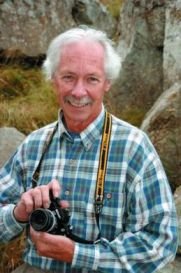 - by Katia Moskvitch -
- by Katia Moskvitch - When Lynn Ball, 62, an accomplished Canadian photographer and the first ever staff photographer for Canadian Press, arrived in London, Ontario in November 2005 with his younger brother Doug, they came to present their new book, Life on a Press Pass.
(Photo courtesy of www.presspass.ca)
The book features photos the brothers took throughout their careers. Although the presentation took place at University of Western Ontario, it didn’t just attract the attention of students and faculty; Ball’s relatives and friends came as well. Even his high school English teacher Bob Mann showed up. Mann said he hasn’t seen his former pupil for 40 years.
“Except for some facial hair, he hasn’t changed a bit! I always knew he was going to do something that was going to be different, and strange, and it was going to be good,” said Mann with a smile.
And Ball has done something good.
Most people don’t know Ball’s name, but they probably know his pictures. He took pictures of the Beatles, of Princess Diana and Prince Charles’ royal wedding, of the Maple Leafs winning the Stanly Cup and of Pope John Paul II during his 1984 Canadian tour, to name a few.
But, there was more to this visit to London than just promoting the book. It was an occasion for Ball to visit his hometown.
Ball was born in Edmonton, Alberta, on January 9, 1943, but grew up in London. His father served in the Second World War, and at the time of Ball’s birth, was stationed in Edmonton with his wife. After the war, the family moved to London.
Ball’s mother was an office worker in London, and she also specialized in applying color to black-and-white photos. But she wasn’t the only one in the family who had something to do with photography. During the war, Ball’s father was an aerial photographer, taking pictures while flying over sites to be bombed.
It was his father who got young Ball into photography. Their house had a darkroom to develop film, and Ball thought every house had one as well.
“When I went into other kids’ houses to play, I’d look around and ask them where their darkroom was, and they’d all look at me like I was crazy,” said Ball, while driving around London a few hours before the presentation of his book. He couldn’t find a parking spot and ended up doing the interview in the moving car. Ever since Ball left his home in London, he has spent most of his career moving around at a frantic pace.
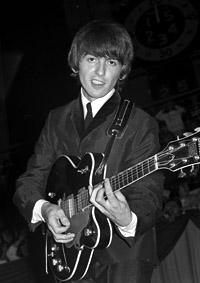 (George Harrison in 1964. By Lynn Ball. Photo from http://www.lfpress.com/)
(George Harrison in 1964. By Lynn Ball. Photo from http://www.lfpress.com/)He attributes some of his success to his father, who taught Ball the basics of good photography when the he was only a boy.
“ The first time I made eight-by-ten prints, I must’ve been 10 or 11 years old. My father wanted to see them, and I knew they weren’t the best. He ripped them up and told me to get back into the darkroom until I could make the best of those negatives. So I learned pretty fast that you had to do a good job and you never showed anyone anything unless it was the best that was possible,” said Ball.
Ball won his first photography award when he was 13, for a picture of a baby bird that fell out of its nest.
“I put it back in the nest, but I took some pictures on the ground, with its mouth open and closed,” recalled Ball. “I entered them in the hobby fair at the YMCA and I won first prize.”
Photography is not Ball’s only passion; he also enjoys watching car races. Once, when he was 22 and was working as a copy boy at the London Free Press, he went to see a race, and one of the cars suddenly stopped.
“A radiator hose sprayed the driver with hot water, and he jumped out and took his pants off,” he said. “With my camera, I clicked away!”
Those pictures ran on the front page of the Free Press, CP became interested in them, and eventually they were used all over the world. That was how Ball started working for CP, and later he became their first staff photographer.
CP’s salary was enough for Ball to buy his first Corvette when he was 23. Besides watching car races, he loves driving racecars and competing.
He went to many car races with his Corvette, and won several. He said it was fun racing his brother Doug, who also has a Corvette, through the UWO campus at night, when both were in their 20s.
“We could only do it once every night, because after that, police would come,” Ball said with a laugh.
Ball spent 45 years of his life as a photographer, and 32 of them as chief photographer of The Ottawa Citizen, where he worked after he left CP, until his retirement in 2003.
He said he doesn’t have a favorite picture. But one of the most memorable photos, he mentioned, was one with a heron on a riverbank in the morning fog, which he snapped while going to work. He was working at The Ottawa Citizen at the time, and so many people wanted reprints that the newspaper made over $40,000 from the suddenly famous heron. Ball received a $1,000 bonus.
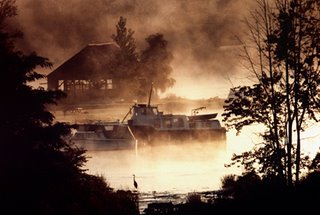 Photo by Lynn Ball
Photo by Lynn BallThat was the picture Ball’s aunt Eileen Coulson got for Christmas. She has known Ball since he was born, and said he was always into taking pictures.
“He was always energetic and on the go, and it’s been a joy to know him all his life,” said Coulson, after the presentation at UWO.
Now retired, Ball still enjoys taking pictures, driving his two Corvettes and living on a farm with his long-time partner. He also has a 26-year-old daughter Fiona.
Even though he couldn’t get Fiona into photography, his brother’s children are quite keen on clicking away. Ball just hopes they will continue the family’s legacy of looking at life through the camera lens.

(Leonard Cohen on a park bench in Montreal. By Lynn Ball. Photo courtesy www.presspass.com)
Tuesday, March 21, 2006
A great quote... in Russian
И.Е. Репин: "В душе русского человека есть черта особого, скрытого героизма … он лежит под спудом личности, он невидим. Но это - величайшая сила жизни, она двигает горами… Она сливается всецело со своей идеей, "не страшится умереть". Вот где ее величайшая сила: она не боится смерти".
Monday, March 20, 2006
Thursday, March 16, 2006
Wednesday, March 15, 2006
Relaxing at a Russian dacha
These are some pics from the dacha of my friend Nadya. It's interesting to notice that in Russia people build their cottages out of wood, but do not paint it, neither inside nor outside. So the houses are all of natural, light color, and it feels like you're really somewhere out in the nature, in the wild...

Nadya and I in front of her dacha
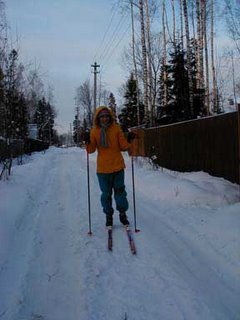
Nadya, cross-country skiing
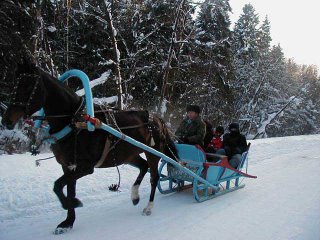
A village horse
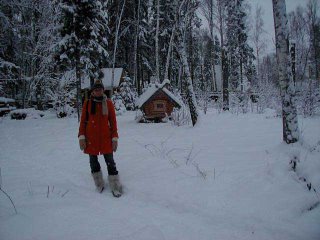
Me in the yard of neighbors' dacha
My dad

Nadya and I inside the house

Nadya and I in front of her dacha

Nadya, cross-country skiing

A village horse

Me in the yard of neighbors' dacha
My dad

Nadya and I inside the house
Filming in Russian villages
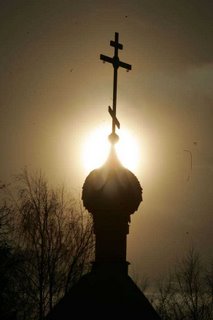
Russian villages are beautiful, especially in the winter.
I guess it's the snow that gives them this natural beauty, makes them a part of nature.
And if you don't think about how poor the people who live there are, how difficult their life is, if you close your eyes on the fact that many do not have running water at home and have to go elsewhere in the village and carry it home in buckets, if you forget that the majority are pensioners who get about $100 per month and are starving, if you manage to make yourself not to think about all this, you'll appreciate the real beauty of Russian countryside...
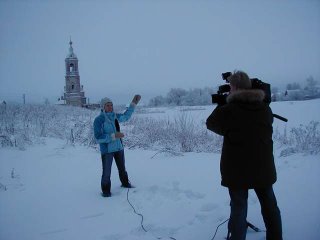
Reporting from a village Konstantinovo, about 2 hours from Moscow

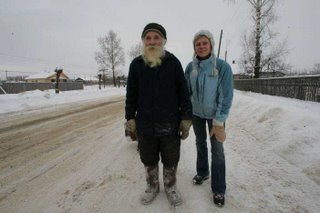
Me and a Russian grandpa
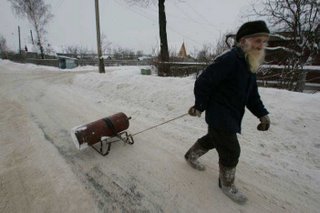
Russian grandpa pulling a sled with a gas ballon
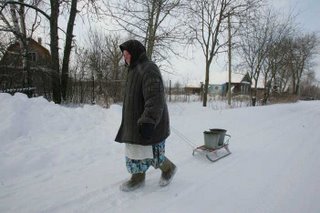
Russian grandma pulling a sled with buckets of water
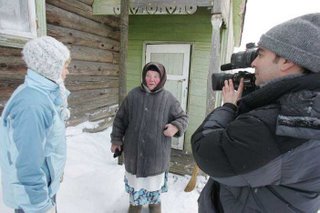
Filming a Russian grandma for a feature about valenki

A valenki (traditional Russian winter felt boots) factory
How I celebrated New Year 2006
This New Year cost me a lot of nerves.
I was actually very excited about it, mostly because I knew I was going to go with our cameraman and do a live report from the Red Square during the New Year's celebration. When we got to the Red Square, it was all illuminated, and full of people. Mostly foreigners from former republics, some Russians, as I understood, not Moscovites, and a few foreign tourists.
We got lucky in a sense that we didn't have a lisence to film on the Red Square, but never got stopped. Actually, we were able to go through the crowd right up to the central stage, where for whatever strange reason the security guards actually helped us over the fence and we stayed with the rest of the press. But as soon as we were on the other sidem and the cameraman was happily filming away, I noticed that I lost my cell phone.
If I had lost my phone in Canada, I know I would not have been upset. But in Moscow, on the Red Square, ten minutes before the clock strikes midnight and my family tries to reach me to wish me happy New Year, that was different. I almost cried. I knew it got stolen, as it was in my coat's exterior pocket. The pocket was zipped, too, but I think when I was carrying the tripod in the crowd, someone might have very well unzipped it.
Because of that phone issue, I began worrying about me being on the Red Square. I remembered all the recent acts of terror, and that particular place at that particular time was a perfect spot for terrorists. We went through a number of militia guards when entering the square, just like everyone else did, but the way they checked people didn't seem to be too reassuring. I was certain someone could've brought in a bomb.
Putin finished his speech on the giant screen right above the stage. The Kremlin clock started striking 12, but I think my heart was beating louder than it. I was sure everything was going to blow, and was looking for a place to hide, or to run away in case of panic. But people around me were smiling. And suddenly, everyone shouted: "Happy New Year, Moscow! Happy New Year! S Novim godom!"
And nothing blew up.
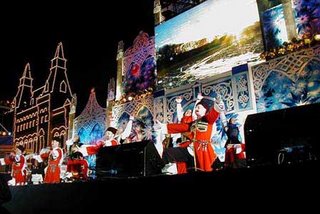
Central stage on the Red Square


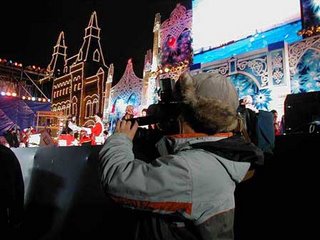
Sasha filming
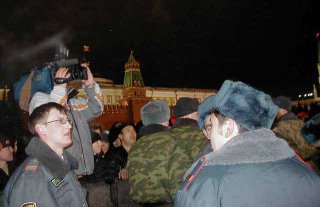
Russian militia at the stage
I was actually very excited about it, mostly because I knew I was going to go with our cameraman and do a live report from the Red Square during the New Year's celebration. When we got to the Red Square, it was all illuminated, and full of people. Mostly foreigners from former republics, some Russians, as I understood, not Moscovites, and a few foreign tourists.
We got lucky in a sense that we didn't have a lisence to film on the Red Square, but never got stopped. Actually, we were able to go through the crowd right up to the central stage, where for whatever strange reason the security guards actually helped us over the fence and we stayed with the rest of the press. But as soon as we were on the other sidem and the cameraman was happily filming away, I noticed that I lost my cell phone.
If I had lost my phone in Canada, I know I would not have been upset. But in Moscow, on the Red Square, ten minutes before the clock strikes midnight and my family tries to reach me to wish me happy New Year, that was different. I almost cried. I knew it got stolen, as it was in my coat's exterior pocket. The pocket was zipped, too, but I think when I was carrying the tripod in the crowd, someone might have very well unzipped it.
Because of that phone issue, I began worrying about me being on the Red Square. I remembered all the recent acts of terror, and that particular place at that particular time was a perfect spot for terrorists. We went through a number of militia guards when entering the square, just like everyone else did, but the way they checked people didn't seem to be too reassuring. I was certain someone could've brought in a bomb.
Putin finished his speech on the giant screen right above the stage. The Kremlin clock started striking 12, but I think my heart was beating louder than it. I was sure everything was going to blow, and was looking for a place to hide, or to run away in case of panic. But people around me were smiling. And suddenly, everyone shouted: "Happy New Year, Moscow! Happy New Year! S Novim godom!"
And nothing blew up.

Central stage on the Red Square



Sasha filming

Russian militia at the stage
I don't need a seatbelt, I'll just fly out of the car!
Two things that bothered me the most in Moscow was the total absence of answering machines and people not fastening their seatbelts in cars. And I mean, literally no one uses a seatbelt. When I asked some people why they do it, they answered that it was actually safer not to put a belt on. If you do, in case of an accident you're stuck in the car and die. If you don't, you'll just fly out, breaking the windshield!
People crush and die every day in Russia because they don't wear seatbelts. And still, unless militia starts giving tickets on a regular basis for this, I don't believe anyone will. What is it with Russians?
People crush and die every day in Russia because they don't wear seatbelts. And still, unless militia starts giving tickets on a regular basis for this, I don't believe anyone will. What is it with Russians?
My trip to Moscow -- Second half of January
Time was flying by. I was going to leave Reuters, to leave Moscow, to go back to London, Ontario. I did not want to.
However, I didn't have time to be sad and think about going back. I had to finish three features, and it was problematic to get some important interviews. Not because people weren't willing to talk to me, but mostly because in Russia, arranging interviews can be a challenging process.
You see, there are no answering machines there. Not on mobile phones, and neither on fixed onecs. Not even when one has to call to administrative and government places, like the Douma or different ministries. There are no call waiting, either. So every morning when I arrived to work, I spent at least three hours before lunch break on the phone. Often the phone was busy, other times no one answered, and if someone did answer, it would be a receptionist or secretary, who, if they do transmit a message, it would be useless to wait for a call back. So that was different.
When I finally got all my interviews and almost finished editing, I found out that one of my interviews was on a tape that by mistake ended up in a suitcase of a cameraman who left for a couple of days to Kursk. I was very stressed when I called him, scared that he had already recorded over my stuff. But he didn't. He came back late Friday night, when I was already gone. It was officially the last day of my internship, and I was to leave Moscow on Monday. But I went back to work on Saturday to finish my story...
Besides some stress because of the lost tape, my last two days at work very lots of fun. I brought cakes, chocolate and a bottle of wine. It's a tradition in Russia--whenever someone leaves, he or she organizes a little get-together.
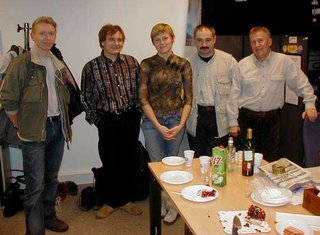
Me and our camera crews
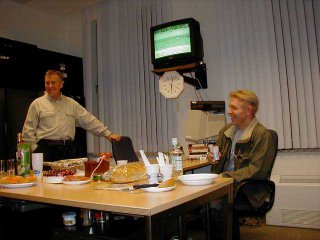
Valera (cameraman) and Tolya (assistant cameraman)
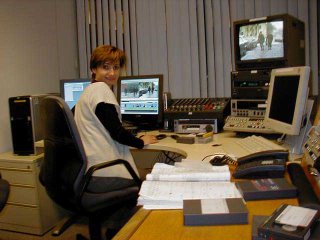
Ira (telecommunications engineer)

Me and Heleen (producer)
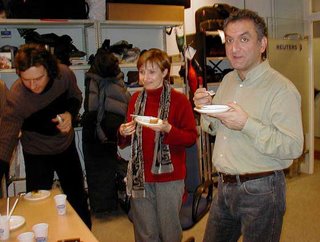
Sog (main producer), Kolya (producer) and Ira, having some cake at my good-bye party
However, I didn't have time to be sad and think about going back. I had to finish three features, and it was problematic to get some important interviews. Not because people weren't willing to talk to me, but mostly because in Russia, arranging interviews can be a challenging process.
You see, there are no answering machines there. Not on mobile phones, and neither on fixed onecs. Not even when one has to call to administrative and government places, like the Douma or different ministries. There are no call waiting, either. So every morning when I arrived to work, I spent at least three hours before lunch break on the phone. Often the phone was busy, other times no one answered, and if someone did answer, it would be a receptionist or secretary, who, if they do transmit a message, it would be useless to wait for a call back. So that was different.
When I finally got all my interviews and almost finished editing, I found out that one of my interviews was on a tape that by mistake ended up in a suitcase of a cameraman who left for a couple of days to Kursk. I was very stressed when I called him, scared that he had already recorded over my stuff. But he didn't. He came back late Friday night, when I was already gone. It was officially the last day of my internship, and I was to leave Moscow on Monday. But I went back to work on Saturday to finish my story...
Besides some stress because of the lost tape, my last two days at work very lots of fun. I brought cakes, chocolate and a bottle of wine. It's a tradition in Russia--whenever someone leaves, he or she organizes a little get-together.

Me and our camera crews

Valera (cameraman) and Tolya (assistant cameraman)

Ira (telecommunications engineer)

Me and Heleen (producer)

Sog (main producer), Kolya (producer) and Ira, having some cake at my good-bye party
Running after Mike Crawley from AIM PowerGen Corporation
When I first contacted Mike, the president and CEO of one of the most known Canadian wind power developers, on the phone he seemed to be a pretty nice guy. Polite. Friendly. We set up a meeting for 4pm on a Thursday, and I told him I'd appreciate if we could film right at 4 only because the sun goes down at around 5:30 in the winter. He was perfectly fine with that.
The construction site of Port Burwell, where wind turbines are being installed, is about an hour from London by car. So I found a classmate who would drive me there (I didn't have a car) and help me film.
When we got to the construction trailer, I was in a great mood. It was starting to get a bit windy and snowy, but was still ok for filming. With a big smile, I knocked at the trailer's door.
The guy who opened the door said his name was Art, and that he was the site manager. He told me Mike was not going to be there that day, and that he almost never comes to the site. I told him I was supposed to meet Mike at the constcuction site, and would really appreciate if he (Art) could take us there. He gave us a pair of huge construction boots each, goggles and hard hats. And told us to follow him.
By the time we got to the construction site, it started snowing. Mike wasn't there. We tried calling him, he wouldn't answer. Art kept saying something like: "Ooh, I donno guyzz... Mike is never here... And you never had any safety orientation..." For him, it wasn't enough to see us all dressed up like clowns in those boots, hats and goggles. I was beginning to loose temper.
We went back to the trailer, and I called Mike once again. "Oh, Katia? I'm sorry, I just had a board meeting! I'll be at the site in 5 min!"
Back at the site, we waited for him for at least 20min. It was snowing very heavily now, and getting dark, too. Finally, he showed up... with four cars following him. He brought his board members with him on a tour. At the same time that he was supposed to meet me for an interview. I was shocked.
I told him it was not going to work out. It was way too dark and snowy. We had to reschedule. He promised that next time he would spend at least three hours on the site with me. He said it'd be next Tuesday.
---------------------------------------------------------------------------------------------------------
It takes an hour to go to Port Burwell from London, Ontario. And an hour to get back. I wasn't too happy about going back to Port Burwell, but I knew I had to.
So I called Mike on Monday to confirm about me coming on Tuesday, the following day. He said he'd be there at 2pm. We said "See you tomorrow" to each other, and the next day, I was in Port Burwell again.
When I entered the trailer, Art met me. Same as the first time, he looked very surprised to see me. "Mike? He is not here today, and won't be here. He told me you were coming tomorrow!"
It was getting ridiculous. I called Mike's cell phone. Sure enough, the guy was in Toronto. He thought we were meeting tomorrow. Even though I called him yesterday to confirm! I was mad, I did not want to come back to Port Burwell again. So I suggested interviewing Art, and filming him around the construction site. I knew he was a little slow, but it was better than having to drive here agian the next day. Mike spoke to him on the phone, and Art started getting ready.
When we were about to exit the trailer, a back office door opened and a big, angry-looking person stormed out of it. "He is not going anywhere!" he screamed. "I'm the company director, and he has to listen to my odrers! We are way too busy, and I can't have him wandering around! Art, you are staying here!"
When I tried to explain that I was a journalist, that it was second time I was being stood up, that I just can't come back here again, he wouldn't listen. Art couldn't do anything. Mike wasn't there. And I had to go back to London.
---------------------------------------------------------------------------------------------------------
No, I didn't give up. I had to get my story. I went back there the next day. Mike was half an hour late, but he did show up. And I finally got my footage.
But I'm never dealing with those people again!
The construction site of Port Burwell, where wind turbines are being installed, is about an hour from London by car. So I found a classmate who would drive me there (I didn't have a car) and help me film.
When we got to the construction trailer, I was in a great mood. It was starting to get a bit windy and snowy, but was still ok for filming. With a big smile, I knocked at the trailer's door.
The guy who opened the door said his name was Art, and that he was the site manager. He told me Mike was not going to be there that day, and that he almost never comes to the site. I told him I was supposed to meet Mike at the constcuction site, and would really appreciate if he (Art) could take us there. He gave us a pair of huge construction boots each, goggles and hard hats. And told us to follow him.
By the time we got to the construction site, it started snowing. Mike wasn't there. We tried calling him, he wouldn't answer. Art kept saying something like: "Ooh, I donno guyzz... Mike is never here... And you never had any safety orientation..." For him, it wasn't enough to see us all dressed up like clowns in those boots, hats and goggles. I was beginning to loose temper.
We went back to the trailer, and I called Mike once again. "Oh, Katia? I'm sorry, I just had a board meeting! I'll be at the site in 5 min!"
Back at the site, we waited for him for at least 20min. It was snowing very heavily now, and getting dark, too. Finally, he showed up... with four cars following him. He brought his board members with him on a tour. At the same time that he was supposed to meet me for an interview. I was shocked.
I told him it was not going to work out. It was way too dark and snowy. We had to reschedule. He promised that next time he would spend at least three hours on the site with me. He said it'd be next Tuesday.
---------------------------------------------------------------------------------------------------------
It takes an hour to go to Port Burwell from London, Ontario. And an hour to get back. I wasn't too happy about going back to Port Burwell, but I knew I had to.
So I called Mike on Monday to confirm about me coming on Tuesday, the following day. He said he'd be there at 2pm. We said "See you tomorrow" to each other, and the next day, I was in Port Burwell again.
When I entered the trailer, Art met me. Same as the first time, he looked very surprised to see me. "Mike? He is not here today, and won't be here. He told me you were coming tomorrow!"
It was getting ridiculous. I called Mike's cell phone. Sure enough, the guy was in Toronto. He thought we were meeting tomorrow. Even though I called him yesterday to confirm! I was mad, I did not want to come back to Port Burwell again. So I suggested interviewing Art, and filming him around the construction site. I knew he was a little slow, but it was better than having to drive here agian the next day. Mike spoke to him on the phone, and Art started getting ready.
When we were about to exit the trailer, a back office door opened and a big, angry-looking person stormed out of it. "He is not going anywhere!" he screamed. "I'm the company director, and he has to listen to my odrers! We are way too busy, and I can't have him wandering around! Art, you are staying here!"
When I tried to explain that I was a journalist, that it was second time I was being stood up, that I just can't come back here again, he wouldn't listen. Art couldn't do anything. Mike wasn't there. And I had to go back to London.
---------------------------------------------------------------------------------------------------------
No, I didn't give up. I had to get my story. I went back there the next day. Mike was half an hour late, but he did show up. And I finally got my footage.
But I'm never dealing with those people again!
How is it, being a journalist?..
A few words about the production process of my UWO TV doc on windmills.
When I finished writing my proposal and started setting up interviews, my potential (desireable) contacts' list looked like this:
1. Ontario Minister of Energy Donna Cansfield;
2. Some farmer guy;
3. A wind power protester;
4. Someone from the municipal government of an area where people are against wind turbines;
5. Someone from a wind power company.
Well, the Minister apeared to be too busy. Well, of course, between signing documents and going to meetings it's hard to find 15 min (all I was asking for) for an interview. So, she sent my demand to their parliamentary assistant, Jeff Leal, one of Ontario's MPPs. That was good enough for me, and the interview went great.
Now, a farmer... My farmer was amazing. He would do whatever I asked him to. I filmed him around the cattle, then he got on his tractor and we went to look at his pride--the turbine. He did give some good quotes, but man, it was hard to just make him admit that farming is in crisis now and that his turbine does help his wallet a lot. Finally he did say it though.
The protester was great too, no comment on that. I got a great interview and some great action of putting a Stop Wind Turbines sign on someone's property.

(Source: http://www.bhcc.ca/roadside_signs.htm)
As for the municipal government of the area, I met with the mayor. She was... interesting. She would say a sentence and then start laughing. And laughing. And laughing. In the end, all I got was a 20 minutes of political terminology and laughs. Oh well, I guess she was in a good mood. It was, after all, a Saturday.
And finally, my favorite part of this story. A guy from a wind power company! But that deserves to be a separate story.
When I finished writing my proposal and started setting up interviews, my potential (desireable) contacts' list looked like this:
1. Ontario Minister of Energy Donna Cansfield;
2. Some farmer guy;
3. A wind power protester;
4. Someone from the municipal government of an area where people are against wind turbines;
5. Someone from a wind power company.
Well, the Minister apeared to be too busy. Well, of course, between signing documents and going to meetings it's hard to find 15 min (all I was asking for) for an interview. So, she sent my demand to their parliamentary assistant, Jeff Leal, one of Ontario's MPPs. That was good enough for me, and the interview went great.
Now, a farmer... My farmer was amazing. He would do whatever I asked him to. I filmed him around the cattle, then he got on his tractor and we went to look at his pride--the turbine. He did give some good quotes, but man, it was hard to just make him admit that farming is in crisis now and that his turbine does help his wallet a lot. Finally he did say it though.
The protester was great too, no comment on that. I got a great interview and some great action of putting a Stop Wind Turbines sign on someone's property.

(Source: http://www.bhcc.ca/roadside_signs.htm)
As for the municipal government of the area, I met with the mayor. She was... interesting. She would say a sentence and then start laughing. And laughing. And laughing. In the end, all I got was a 20 minutes of political terminology and laughs. Oh well, I guess she was in a good mood. It was, after all, a Saturday.
And finally, my favorite part of this story. A guy from a wind power company! But that deserves to be a separate story.
Working on my tv doc and remembering Reuters

When I came back from Moscow in the end of January 2006, I brought three Beta tapes with me. They had on them everything I've accomplished at Reuters during my month and a half internship--edited news stories, and features. My five 5-min features I am so proud of.
In Russia, I was able to produce that many features in 45 days. Here at UWO, in my M.A. of journalism program, every student has to film, edit and voice one 7-min mini-documentary in two months and a half. My doc is on wind power installations in Ontario. Some people like wind turbines, some hate them. For some, especially farmers, it's a source of income; for other people, it's visual pollution. Conflict. Action. What else do one need to make it a good feature?

(source: http://www.mikelevin.com/WindTurbineSunset.jpg)
Working for Reuters helped me a lot. I was the first one in class to finish my doc. It took me three weeks. Most of the students are still working on theirs. Now I'm not saying I'm exceptionally smart or talented, it just shows how much a good internship is actually worth. Some people still have difficulties using Avid. After having edited on deadline several weeks in a row in Moscow, I think I can edit with my eyes closed... Or at least find the right keys pn the keyboard with my eyes closed.


